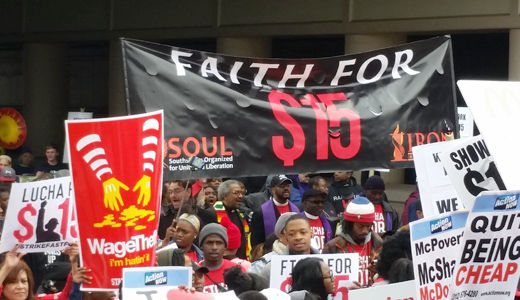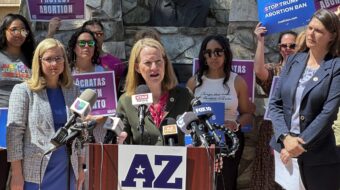
WASHINGTON (PAI) – The stereotype of a minimum wage worker as a teenager making hamburgers at McDonald’s, earning money for high school dates or saving for college, is just plain wrong.
Instead, adults, not teens, are eight of every nine minimum wage workers. And the percentage of teenagers is virtually tied with the percentage of adult low-skilled immigrants.
So says researcher Monica Garcia-Perez, who presented some of her findings to an AFL-CIO-co-sponsored conference on race, income and inequality and elaborated on them in an informal talk with Press Associates Union News Service on August 10 during the conclave.
“The fastest-growing group” among minimum wage workers in the last decade of data “was among low-skilled immigrants,” said Garcia-Perez, an associate professor of economics at St. Cloud State University in Minnesota. “Meanwhile, teenagers are becoming a lower proportion of that same group” of minimum wage earners, she added.
Specifically, from 1994-2014, teenagers declined from 25 percent of all minimum wage workers to 11-12 percent. The low-skilled immigrant adults rose from six percent to 11 percent in those same years, she reported. The proportion of low-skilled black workers – adults, both native and foreign-born – increased from five percent in 1994 to six percent a decade later.
The more important point, she said both in the talk and the interview, is that native-born adults, both those with a high school diploma or less and those with some college, are the two largest groups, percentage-wise, among minimum wage workers.
And ,just like the teens, some of the adults might be in minimum wage jobs as a transition, either to higher-wage jobs or from unemployment to their first job, she noted.
The Labor Department agrees with Garcia-Perez. In a fact sheet on raising the federal minimum wage from its present $7.25 an hour, DOL says only 11 percent of all minimum wage workers are under 20. And it adds 60 percent of all minimum wage workers are women.
That’s not the stereotype used by foes of raising the minimum wage.
For example, Kevin Hassett and Michael Strain of their think-tank mouthpiece, the American Enterprise Institute, call minimum wage workers “secondary earners” in their families. “They are an elderly parent with some retirement income or a spouse with a part-time job. Or they are young people living with their parents,” the two state.
Congress’ ruling Republicans echo those arguments. “The problem is you end up costing jobs from those who are trying to get entry-level jobs,” House Speaker Paul Ryan, R-Wis., a minimum wage hike foe, said earlier this year. “The goal is-ought to be-to get people out of entry-level jobs and into better-paying jobs…I don’t think raising the minimum wage is a very good way to accomplish these goals.”
Photo: Fight for $15 Oak Brook, IL May 20, 2015. Fast Food workers and allies from across the nation shutdown McDonald’s annual shareholders meeting in Oak Brook, IL. Earchiel Johnson | People’s World

MOST POPULAR TODAY

High Court essentially bans demonstrations, freedom of assembly in Deep South

UN warns that Israel is still blocking humanitarian aid to Gaza


Resource wars rage in eastern Congo, but U.S. capitalism only sees investment opportunity

U.S. imperialism’s ‘ironclad’ support for Israel increases fascist danger at home






Comments